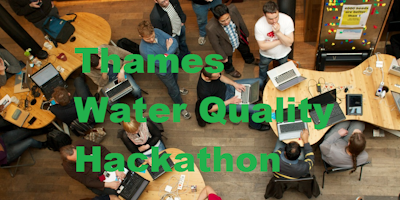Due to unforeseen circumstance, we have rescheduled the hackathon.
Water quality is essential for good river health. It sustains ecological processes that support fish, plants, wetlands and birdlife. Our water resource in Thames catchment is of major environmental, social and economic value to South East region in England. It contributes to farming, fishing and mining as well as recreation and tourism. If water quality deteriorates, the value of water resource can slowly diminish. In UK 75% of rivers and lakes fail to reach European standards for ecosystem health. The eutrophication problem alone has costed billions of pounds to control. Knowing conditions of certain water quality indicators in advance will give water quality managers and other end users like Anglers information to make decision for their activities. Current knowledge of forecasting these indicators is limited and heavily rely on the observations from the field. With the advance in big data analytics, how can you make a difference without being in the field?
Becoming part of the community to protect our river is what the River Water Quality Hackathon challenge is all about. You don’t have to be a trained environmental professional or volunteer on the ground to make a difference.
This challenge is to use your coding skills to help us deliver the best information to end users like anglers or public members on water quality, or make a forecast on water quality near the river you live. The hackathon forms part of a wider project which is looking at how we might use models and other research findings to develop a forecasting system for river water quality. The project is an initial scoping study, based upon a larger ongoing NERC funded research project called POLLCURB (www.pollcurb.ceh.ac.uk) in which data are being collected and water resources models are being developed. To explore the data relevant to this research, we’ve focused this challenge on forecasts and visualisation of water quality.
Build an app, using at least one big data technology, to meet one of the following aims:
-predicting a specific water quality parameter
-visualising the data to reflect the impacts of water quality to citizens or on environment.
The hackathon is being led by Yan Weigang at CEH. If you have any questions, please contact weig at ceh dot ac dot uk.
Location
Dates
to 13th February 2016 - 06:00 PM
